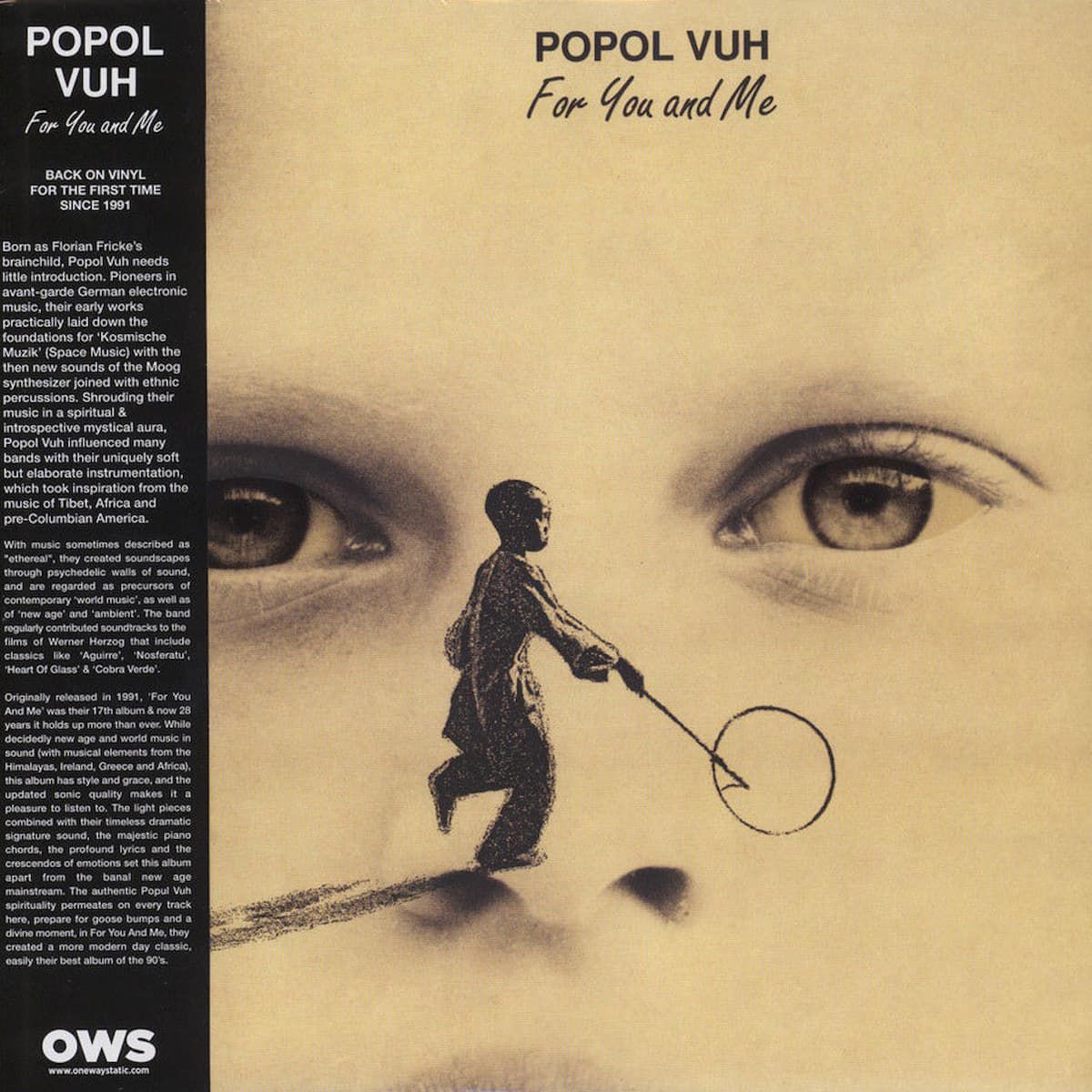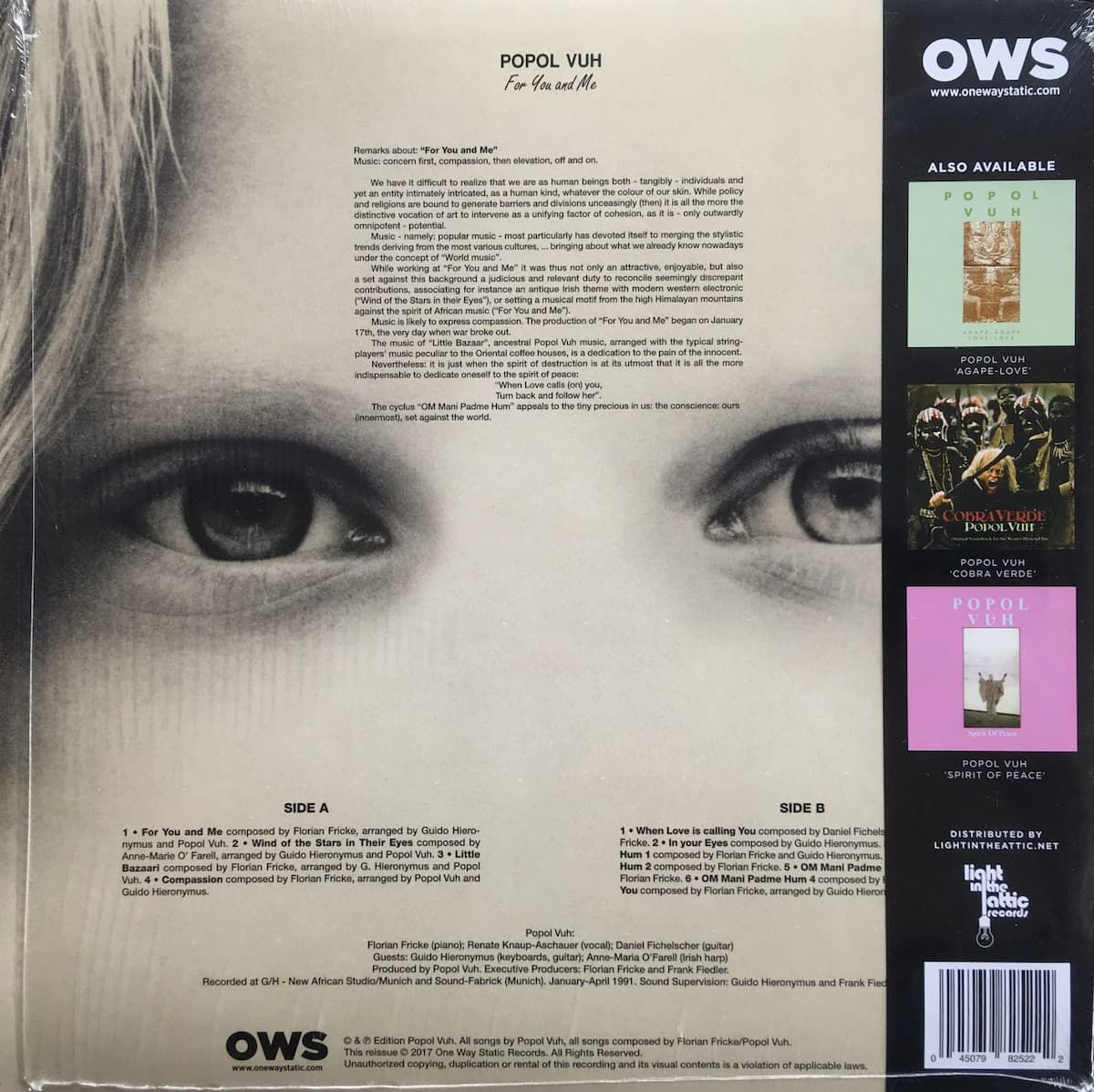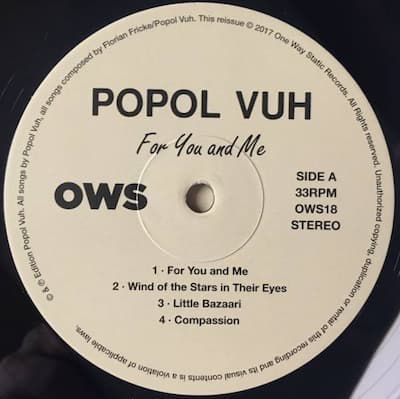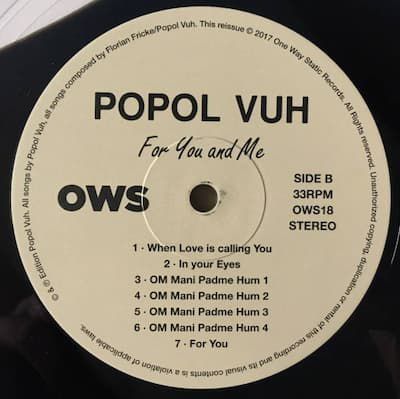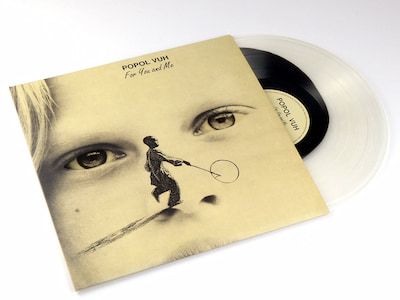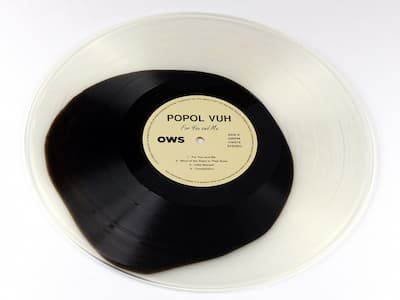FOR YOU AND ME
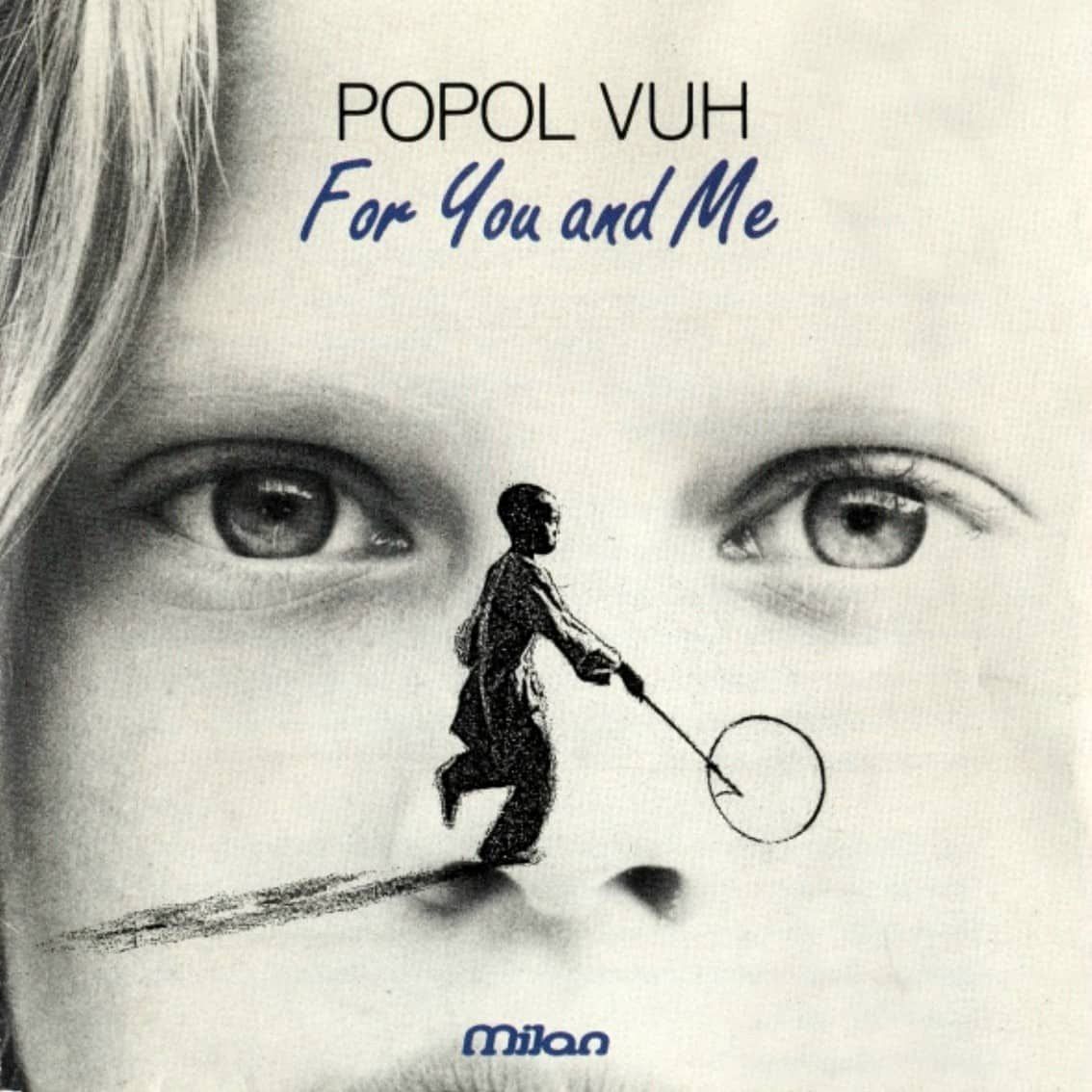
CD: Milan 262 061/BM 650 - 1991 - France
CD: Milan 73138 35615-2 - 1991 - US
LP: Milan A 808 - 1991 - France
CS: Milan 412 061 - 1991 - France
CS: Milan 7313835615-4 - 1991 - US
CD: Milan CH 808 - Switzerland
CD: SPV 70727 - 2006 - Germany [ 1 bonustrack ]
CD: Belle Antique MAR061155 - 2006 - Japan
LP: One Way Static OWS 18 - 2017 [ Black Vinyl: 700 copies ]
LP: One Way Static OWS 18 - 2017 [ Black & clear swirl vinyl: 300 copies ]
Track list from Milan 262 061 - 1991:
For you and me - (Fricke/Arr.by Hieronymus & Popol Vuh) - 5:20
Wind of the Stars in their Eyes - (O'Farrell/Arr.by Hieronymus & Popol Vuh) - 3:10 (see note below)
Little Bazaari - (Fricke/Arr.by Hieronymus & Popol Vuh) - 7:45
Compassion - (Fricke/Arr.by Popol Vuh & Hiernonymus) - 5:00
When love is calling you - (Fichelscher/Fricke) - 4:15
In your Eyes - (Hieronymus) - 0:55
OM Mani Padme Hum 1 - (Fricke & Hieronymus) - 1:10
OM Mani Padme Hum 2 - (Fricke) - 2:47
OM Mani Padme Hum 3 - (Fricke) - 4:33
OM Mani Padme Hum 4 - (Fricke) - 5:18
For You - (Fricke/Arr.by Hieronymus & Popol Vuh) - 2:05
Extra track on SPV - 2006:
OM Mani Padme Hum 3 (piano version) - 4:31
Liner notes from Milan 262 061 - 1991:
Popol Vuh
Florian Fricke - piano
Renate Knaup-Aschauer - vocal
Daniel Fichelscher - guitar
Guests:
Guido Hieronymus - keyboards, guitar
Anne-Marie O'Farell - Irish Harp
Produced: Popol Vuh for Milan Records
Executive Producers: Florian Fricke and Frank Fiedler
Recorded at G/H - New African Studio/Munich and Sound-Fabrik (Munich).
January-april 1991
Sound supervision: Guido Hieronymus and Frank Fiedler
Text booklet from MIlan 262 061 - 1991:
Remarks about: “For You and Me”
Music: concern first, compassion, then elevation, off and on.
We have it difficult to realize that we are as human beings both - tangibly - individuals and yet an entity intimely intricated, as a human kind, whatever the colour of our skin. While policy and religions are bound to generate barriers and divisions unceasingly (then) it is all the more the distinctive vocation of art to intervene as a unifying factor of cohesion, as it is - only outwardly omnipotent - potential.
Music - namely: popular music - most particularly has devoted itself to merging the stylistic trends from the most various cultures, ... bringing about what we already know nowadays under the concept of ‘World music’.
While working at ‘For you and Me’ it was thus not only an attractive, enjoyable, but also a - set against this background a judicious and relevant duty to reconcile seemingly discrepant contributions, associating for instance an antique Irish theme with modern western electronic (‘Wind of the Stars in their Eyes’), or setting a musical motif from the Himalyan mountains against the spirit of African music (‘For You and Me’).
Music is likely to express compassion. The production of ‘For You and Me’ began on january 17th, the very day when war broke out.
The music of ‘Little Bazaar’, ancestral Popol Vuh music, arranged with the typical string-players’ music peculiar tot the oriental coffee houses, is a dedication to the pain of the innocent.
Nevertheless: it is just when the spirit of destruction is at its utmost that it is all the more indispensable to dedicate oneself to the spirit of Peace:
“When Love ealls (on) you,
Turn back and follow her”.
The cylcus ‘OM Mani Padme Hum’ appeals to the tiny precious in us: the conscience: ours (innermost), set against the world (Florian Fricke)
Popol Vuh interpreted mainly compositions by Florian Fricke and incidentally compositions by Daniel Fichelscher and Alois Gromer Khan. "Wind of the Stars in their Eyes" is another exception. It came about from a onetime meeting of Florian with Irish harpist Anne-Marie O’Farrell. The original title "The Knappogue Medley" is her on her album "Harping Bach to Carolan"(1993). This medley includes "The Morrison Jig" and the Irish song, "Fill, Fill a Rún" O’Farrell explains: “... the piece I wrote is based on a version of the ‘Morisson Jig’, and a slow air call "Fill, Fill A Rún Ó" (Come back to me O my love). The slow air is a song from a Roman Catholic mother to her Protestant son to return to 'the' faith.This song comes from a time in Ireland when there used to be greater division regarding different expressions of Christianity' (2012).
1993:
Keyboards: Ende ‘91 hast du die Fangemeinde wiederum überrascht, als du die CD ‘For you and me’ rausgebracht hast. Darauf sind die mit Abstand poppigsten Aufnahmen, die es von popol Vuh je gegeben hat. Und man höre und staune - da kommt auch nach langer Abstinenz wieder Elektronik zum Vorschein.
Florian Fricke: Die Aufnahmen entstanden zwischen januar und April 1991. Und wenn man sich erinnert, war damals der Krieg im Irak, und wir an der Aufnahmen Beteiligten ware nalle sehr betroffen während der Produktion.
Und die Frage kam auf: wie kann man Betroffenheit umsetzen im etwas, was dann nicht in bloßer Niedergeschlagenheit endet, sodnern aufbauend wirkt. Wir haben dann verschiedene Elemente außereuropäischer Musik mit der typischen Popol Vuh-Musik plus Elektronik gemischt. Dahinter stand die Idee, daß die Kriege im wesentlichen dadurch entstehen, daß sich die verschiedenen Kulturen nicht verstehen, die eine Kultur nicht die Eigenheiten der anderen akzeptiert. In den USA z.B. entstand damals, ein neues Feindbild von der ganzen islamisch-arabischer Kultur. und Musik, wie jede kulturelle Tätigkeit, hat die Möglichkeit, politisch zu wirken. Voraussetzung ist, daß sich der Musikmacher als ein Mitbetroffener in dieser Welt versteht.
Keyboards: Von der Ideologie zurück zur musikalischen Praxis. Wie wurde dieser ideologischen Überbau musikalisch umgesetzt?
Florian Fricke: Ich liebe afrikanische Rhyhtmen, ich liebe den einfachen Gesang von jemanden, der die Last auf einen Berg trägt, und ich liebe die uralte, auf Atlantis hinweisende Musik der irischen Harfe. und so habe ich bei ‘For you and me’ versucht, Innen und Außen zu verbinden, die Idee und die Struktur dieser Verbindung. In der instrumentierung haben wir typische Momente z.B. von arabischer Tanzmusik verwendet. Wir haben ein irisches Thema mit elektronischer Musik konfrontiert, oder wir haben bei einem Stück afrikanische Elemente und Rhythmen hinzugenommen.
Keyboards: Damit meinst du wohl das Titelstück ‘For you and me’.
Florian Fricke: Genau. Der Titel allein sagt schon, daß irgend etwas Verbindliches auch für das ‘You’ enthalten ist. Was nichts anders heißt, als das man dieses Lied mitsingen kann. Das ist sicher etwas Neues an der popol Vuh-Musik: Sie ist für den Hörer singbar geworden.
Keyboards: Auf ‘For you and me’ ist Elektronik mit Akustik gemischt. Ist das die Art, wie Elektronik für dich wieder interessant geworden ist?
Florian Fricke: Zunächst mal ist nicht Elektronik im lasten Sinne hinzugekommen, sondern elektronisch gesteuerte Sample-Sounds, die wiederum von normalen, akustischen Instrumenten abstammen. Da ist also nicht die typisch elektronische Kälte. Es ist vielmehr einfach das heute übliche Arbeitsverfahren bei der Musikproduktion.
Keyboards: Bei ‘For you and me’ hast du zum ersten mal mit dem Arrangeur, Gitaristen, Keyboarder und Studiobesitzer Guido Hieronymous zusammengeareitet?
Florian Fricke: Ja, er hat wesentlichen Anteil an der Entstehung der Musik. Guido hat meine Ideen und Vorstellungen vortrefflich umgesetzt, er ist für die Balance zwischen Akustik und Elektronik verantwortlich.
Keyboards: die beiden anderen, Daniel Fichelscher und Renate Knaup sind ja schon seit langem mit Popol Vuh verbunden.
Florian Fricke: Daniel ist als Gitarist and percussion-mann seit rund 8 Jahren dabei, und Renate war die absolute Amon Düül-Sängerin. Schon während die Amon-Düül-Zei war Renate öfter als Gast mit im Studio, sie half mir bei der Aufnahmen am Mischpult. Später dann, als es Amon Düül nicht mehr gab, bot sie sich förmlich als Sängerin für Popol Vuh an.
Keyboards: Ein Mann, nämlich Frank Fiedler ist von Anfang an mit Popol Vuh verbunden, schon damals, als ihr im alten Pfarrhof von Peterskirchen so etwas wie eine Musikkommune wart, und jetzt - bei ‘For you and me’ als Mitproduzent.
Florian Fricke: Frank Fiedler ist immer dabei nicht als Musiker, sondern als jemand der - ich möchte jetzt nicht sagen: “wie Goethe und Eckermann” - über gewisse außermusikalische Fragen, die bei der Musikproduktion oft genau so wichtig sind, mit mir reden kann und mir dann im Studio auch manchmal hilft, da er wesentlich mehr von Technik versteht als ich.(Keyboards)
1995:
i/e: On the album For You and Me, you have “OM Mani Padme Hum”. Can you tell me if this is a mantra, or an inspiration?
Florrian Fricke: That’s one of the main phrases that crosses Asian people’s lips if they’re Buddhists. No matter what they do, whether they light a fire or put it out, they’ll say “OM Mani Padme Hum”. It’s a mantra, a prayer, used at everyday gestures, when one enters a room, or when one walks by a beautiful mountain. By the way, this is the most famous mantra of Asia. It’s almost like the ‘Kyrie Eleison’ of the west. (i/e Magazine)
no reviews yet.
MILAN 73138 35615-2:
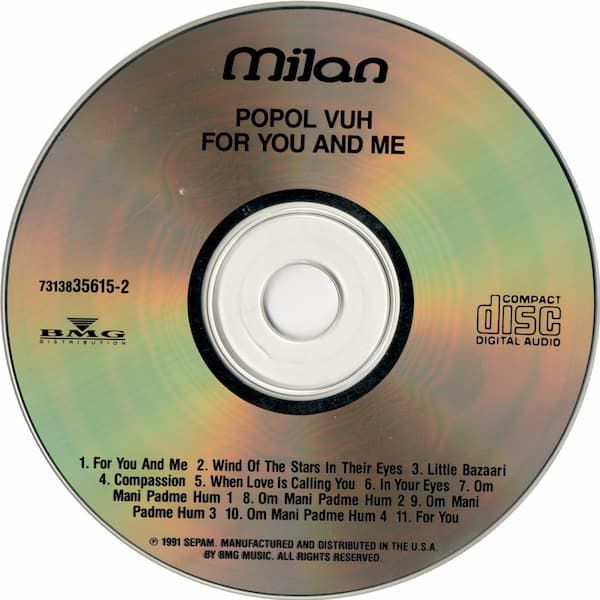
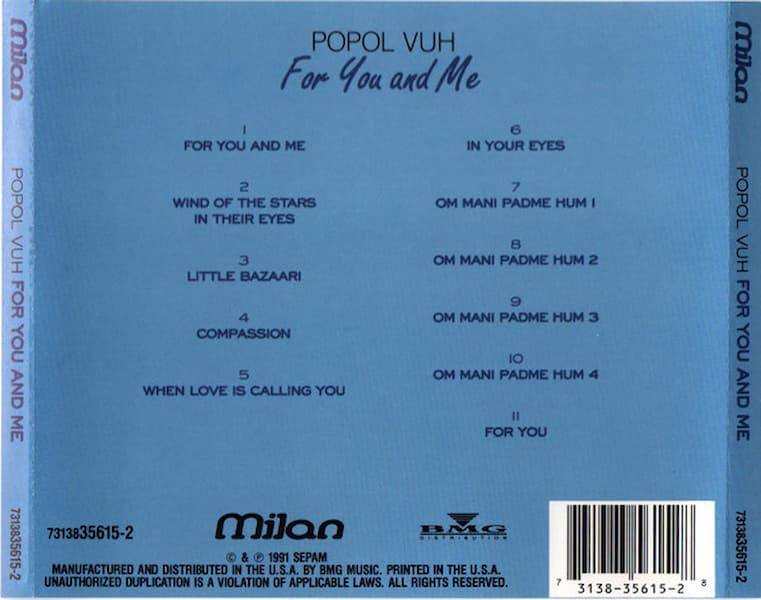
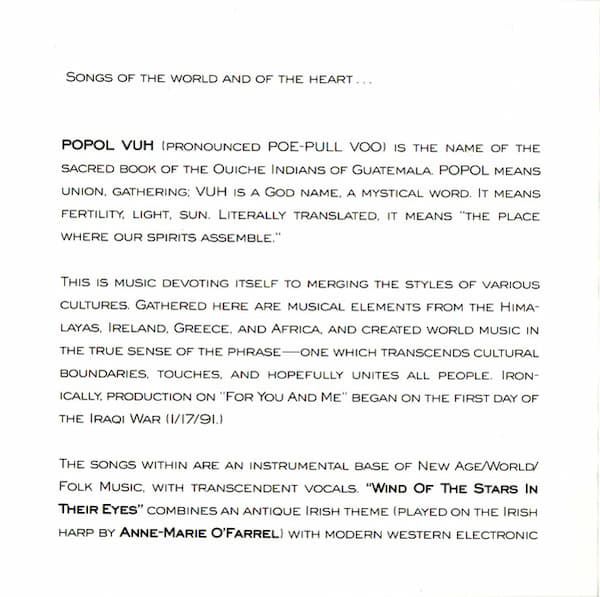
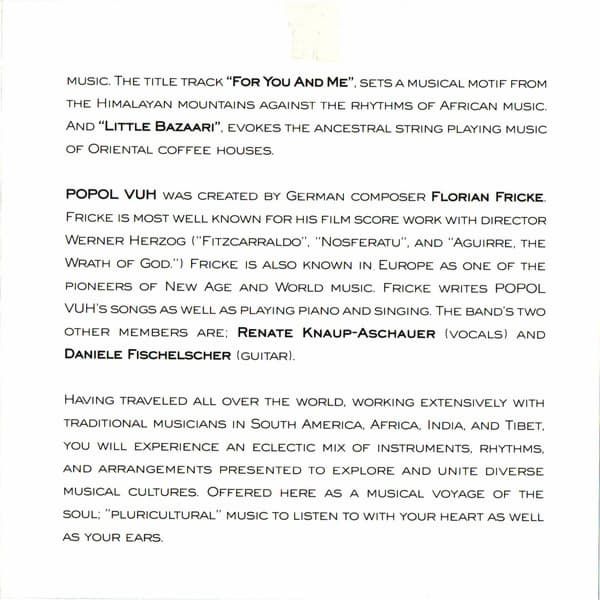
MILAN BM 650:
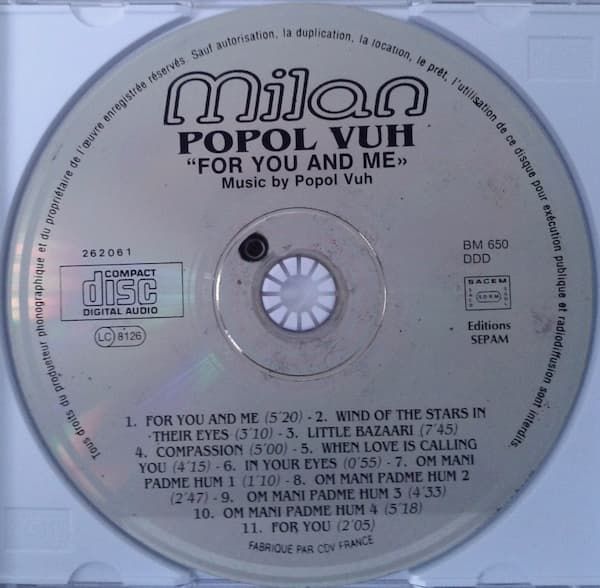
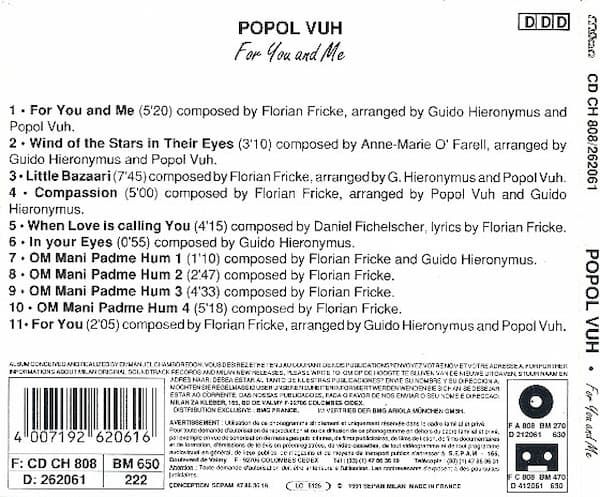
MILAN BOX:
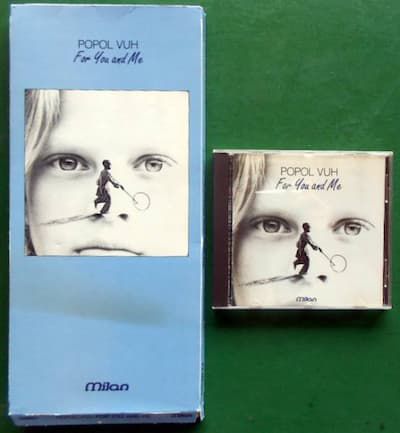
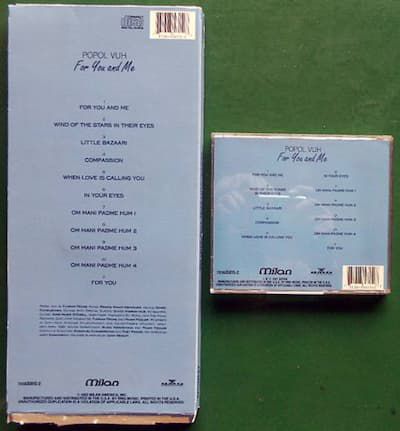
MILAN CS:
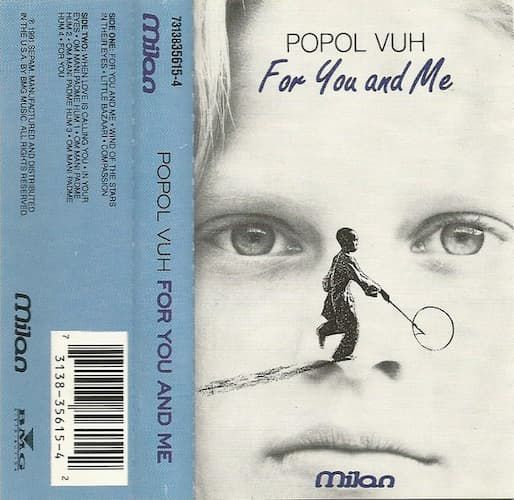
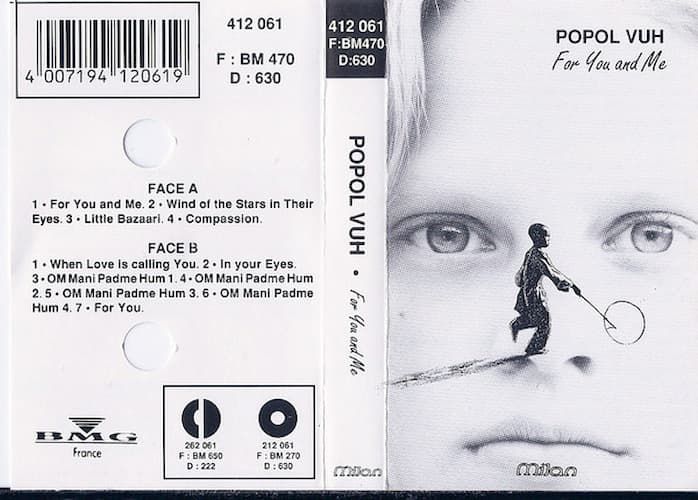
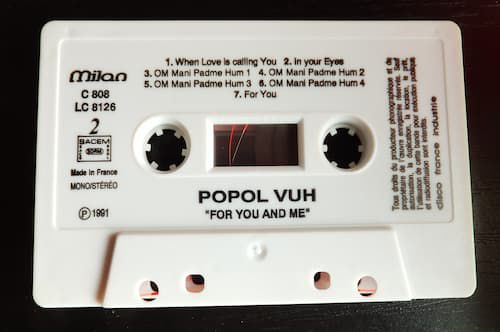
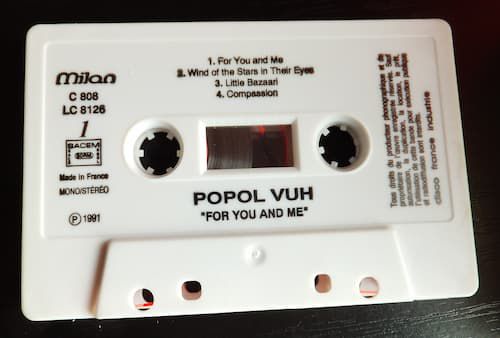
MILAN LP:
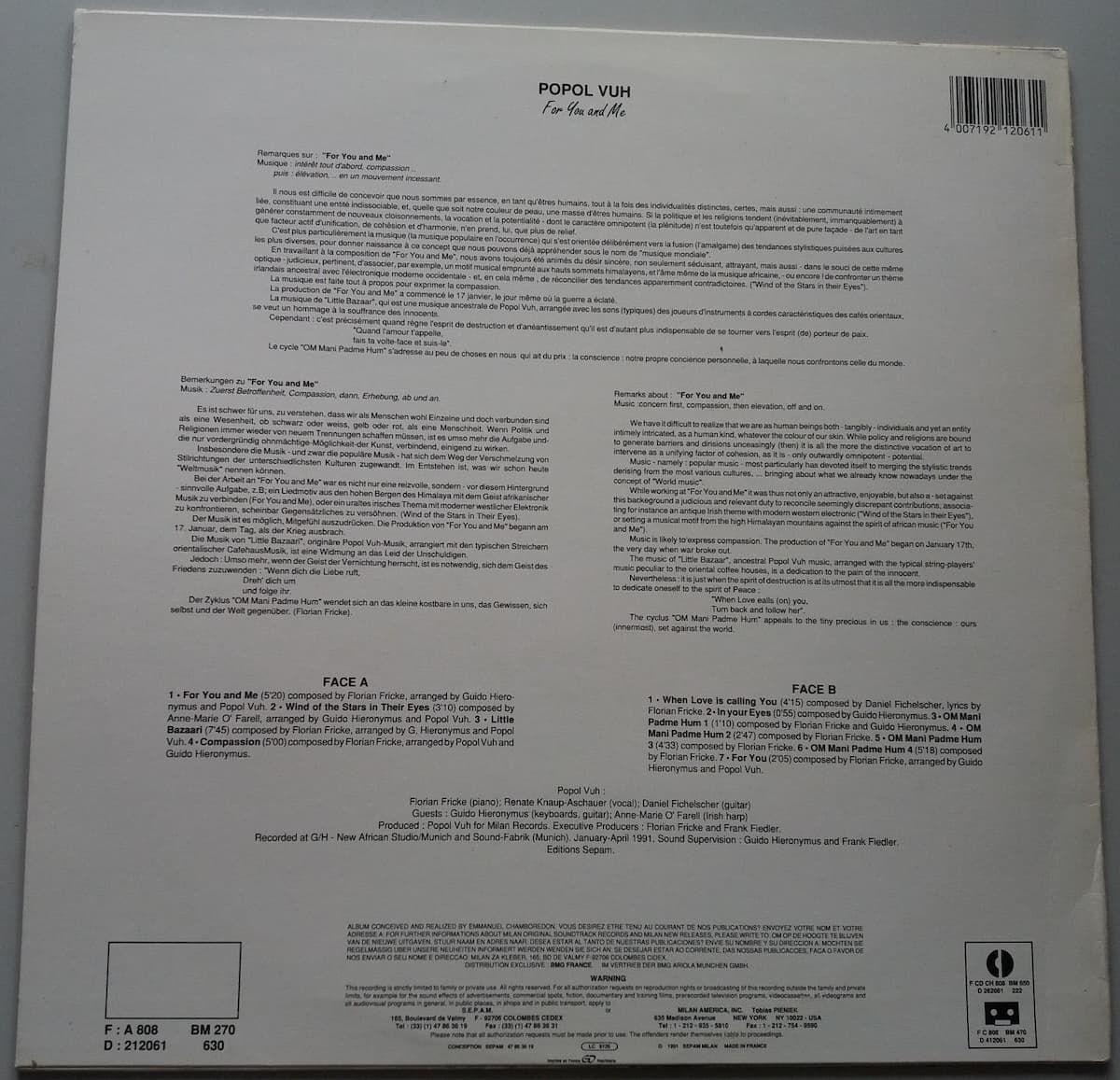
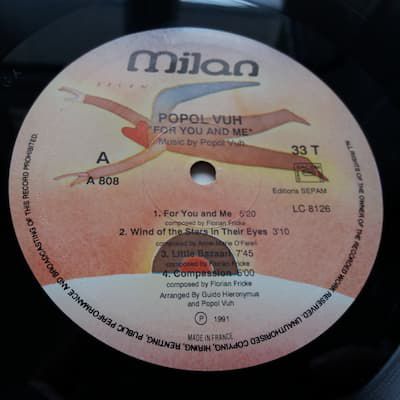
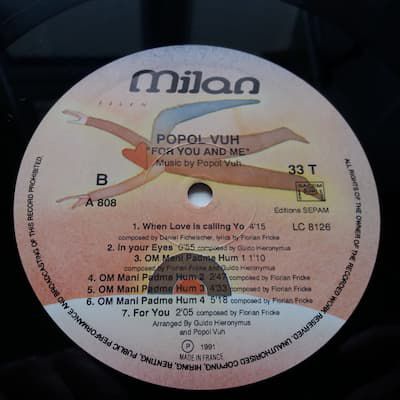
SPV:
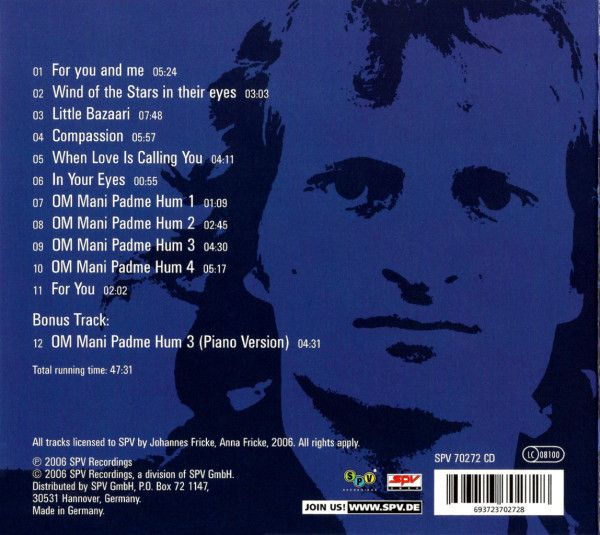
BELLE ANTIQUE:
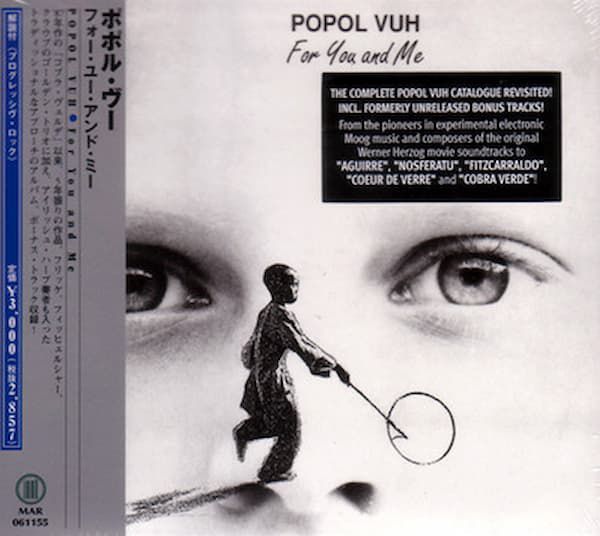
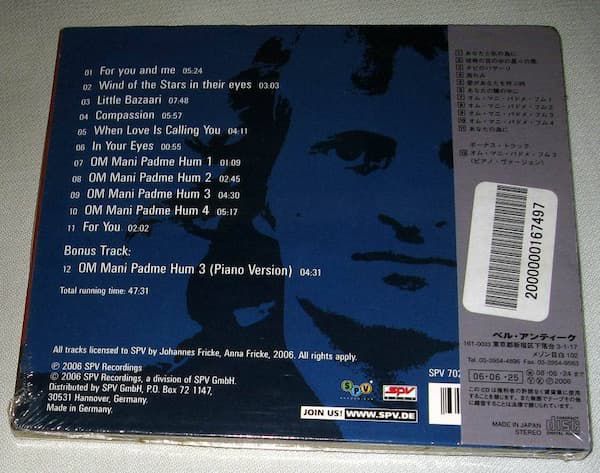
ONE WAY STATIC:
